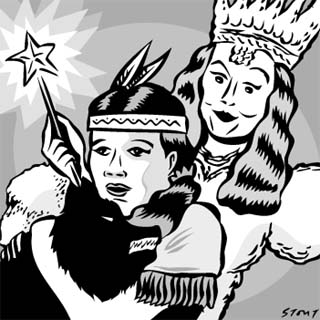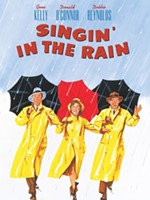Letters at 3AM
The Massacres of Oz
By Michael Ventura, Fri., July 21, 2000

The supermarket racks were rife with TV Guides huckstering 100 years of The Wizard of Oz -- one could choose between four "collector's covers" featuring Judy Garland's earnest, endearing Dorothy about to burst into song. She was 17 and playing a girl of, what, about nine? Eleven? That she could efface her seventeen-ness so thoroughly, radiating no hint of sexuality, is both a tribute to her talent and a little frightening. It wasn't easy. Her strain at first manifested as giggling fits until the director, Victor Fleming, hit her with a sharp slap across the face. She didn't giggle after that. Welcome to Munchkin Land. It's the 61-year-old movie that's being celebrated, or rather marketed, more than the century-old book -- though the spirit of L. Frank Baum's conception is followed closely, and even intensified, in the film. The picture's become what we call "an institution." An odd usage. The word implies a fixed, official structure -- an unchangeable lump of imagery sitting heavily in the psyche, resistant to any truly imaginative intrusion. A blockage rather than a conduit. Oz is fixed in the collective awareness as a wonderland, though Glinda, the good witch, has no such illusion when she sweetly reveals to Dorothy its sinister side: "The sooner you get out of Oz altogether, the safer you'll sleep." We remember the Technicolor rather than the warning.
Even as a boy I wondered why Dorothy wanted to go back to Kansas. It's no place for a child. The girl is snapped and grouched at, when she's not ignored or attacked. The farmhands -- who will reappear as Scarecrow, Tin Man, and Lion -- are bored, inefficient, and put each other down. There is no sign of joy past or present in the face of Auntie Em. And Dorothy's uncle voices only sarcastic resignation, a sure sign of inner defeat. A neighbor wants to destroy her dog, and her protectors are not so much powerless to help as not sufficiently interested to take action. And then a tornado smashes everything, nearly kills her; when the poor kid kicks at the door of the storm-cellar and begs to be let in, the grown-ups don't hear. (You'd think if they gave a damn they'd have been more alert, listening and praying for her arrival.) Even when she finally returns from Oz to the mantra of "There's no place like home" (repeated 14 times!), and desperately begs, "Don't you believe me?" they all lie, saying "Of course we do," though they clearly don't. Better to get slapped around in Hollywood, where at least they listen when you sing.
Orphaned among such people, in such a place, this child is truly alone. Yet the result of her journey is only to make her fear ever leaving again. She promises not to. Oz has driven her more than slightly dottie, as proved by the last words she says to the witch Glinda: "If I ever go looking for my heart's desire again I won't look any further than my own back yard, because if it isn't there I never really lost it to begin with." Wha? What's that mean? The whole point of Alice in Wonderland was that Alice knew the difference, and knew how to use the difference, between sense and nonsense; therefore her tale is instructive. Dorothy starts out knowing little and ends knowing less. She starts with sentiment and desire; she ends with sentiment and confusion. She's seen terrors and wonders and all she's learned is to surrender to her traps. It will take nearly a hundred years for her to grow into Thelma and/or Louise, daughters of a similar landscape, who realize: "You get what you settle for."
But you can't blame the kid. Nobody's playing straight with her. In Oz, Glinda asks if she's a good or bad witch. Dorothy says (twice, if memory serves) that she's not a witch at all. Glinda doesn't listen either; merely repeats her question. Dorothy reveals the narrow aesthetics of her upbringing when she says, "I never heard of a beautiful witch before." Glinda, in turn, reveals her prejudices: "Only bad witches are ugly." Ugly -- defined here cinematically as having a big nose -- is bad. Dorothy, already showing a tendency toward sweet fleshliness, had better watch her weight, lest she too be perceived as not beautiful and therefore "bad."
In Oz, Dorothy kills two sentient beings -- both by mistake, and both witches, who are ugly and bad and good riddance. (The Jungians would say that she's killing her dark side, without which she will not have the strength to free herself -- a conclusion the tale unwittingly confirms.) The kid tries to show a bit of human remorse, for she truly wishes no one any harm, not even big-nosed women. But here she's confronted with one of the most bizarre passages in American cinema: the longest celebration of death ever filmed. Munchkins take no prisoners: "Thank you very sweetly for doing it so neatly. You've killed her so completely. Ding, dong, the witch is dead!" Their dance goes on until the mayor wants to know if the witch is "morally, ethically, spiritually, physically, positively, absolutely, undeniably, and reliably dead!" At which point the Coroner (!) produces a certificate of death. "She's not only really dead, she's really most sincerely dead!"
Is it just me, or is this a little much?
Later Dorothy inadvertently soaks the other lady with a big nose, who promptly dissolves groaning into the ground. (And why didn't Glinda tell her she could defend herself with mere water?) Then the Wizard gleefully puns, "You liquidated her!" (Liquidate is not a funny word; and at the height of European fascism in 1939, when this film was made, it really wasn't funny.)
But that word brings us to something that Oz's creator L. Frank Baum is pointedly not being remembered for. You can read of it in David E. Stannard's superbly researched and harrowing book American Holocaust: The Conquest of the New World. In 1891, Baum was editor of South Dakota's Aberdeen Saturday Pioneer. A week or so before the massacre of the Lakota at Wounded Knee, in South Dakota, Baum "urged the wholesale extermination of all America's native peoples." Baum's words:
"The nobility of the Redskin is extinguished, and what few are left are a pack of whining curs who lick the hand that smites them. The Whites, by law of conquest, by justice of civilization, are masters of the American continent, and the best safety of the frontier settlements will be secured by the total annihilation of the few remaining Indians. Why not annihilation? Their glory fled, their spirit broken, their manhood effaced; better that they should die than live the miserable wretches they are."
In one breath he admits the tribal people are no threat, yet advocates their annihilation. "Total" -- women and children too. Baum claims this is "the justice of civilization." There is nowhere to go from there but to horror, and it comes quickly. Within days, at Wounded Knee, U.S. soldiers massacred more than 200 unarmed Lakota, two-thirds of them women and children. Far from trying to hide the atrocity, the killers bragged of it -- bragged to a nation so without conscience that they were not only sure to escape penalty, or even censure, but were instead certain of approval. They got it. Four days after news of this mass murder was circulated, L. Frank Baum crowed: "We had better, in order to protect our civilization, follow it up ... and wipe these untamed and untamable creatures from the face of the earth."
The English poet and theologian John Donne had cautioned that you'd best not ask for whom the bell tolls, "it tolls for thee." To which L. Frank Baum replied: Ding, dong.
Nine years later, when Baum set himself to make a little money and write a tale for children, the best he could manage was a moral mess -- which a morally messy culture took to heart. Or whatever heart its proven and repeated heartlessness could manage. In spite of his best intentions (if we can speak of a man like this as having "best intentions"), all he could imagine as ideal was a sentimental and somewhat frantic girl who kills in spite of herself, and whose very dream condemns her to surrender to the barren and constricted place she calls "home."
Glinda had a point: "The sooner you get out of Oz altogether, the safer you'll sleep." The book's the template of the film, where the ambiguities of The Wizard of Oz leave us, like Dorothy, where we started, and condemned to stay there. Sing "Over the Rainbow" your whole life and you'll die of a drug overdose. Like lovely Judy. If you're going to kill anybody, kill Auntie Em. The Auntie Em Baum in yourself. Or you'll have to wait another hundred years for Thelma and Louise to free your ass.
Follow the yellow brick road ... to Wounded Knee. ![]()








